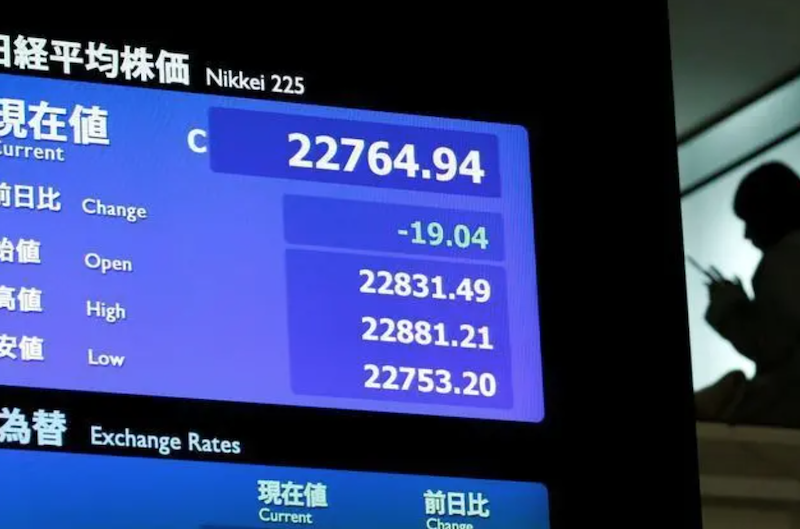Asian shares suffered on Tuesday, hit by pessimism over the likely impact of China’s latest rate cut on its struggling economy.
China, in a highly anticipated move, cut its benchmark loan prime rates (LPR) for the first time in 10 months on Tuesday, but the 10-basis point reduction in the five-year LPR was smaller than many had expected.
But, despite the disappointment, Tokyo’s benchmark Nikkei index managed to trim earlier losses and ended slightly higher thanks to a weaker yen and its boost for exporters.
Also on AF: China Bankers to Shun ‘High-End Taste’ Fearing Regulatory Ire
There was also a boost for Japan’s markets after Berkshire Hathaway, run by US billionaire investor Warren Buffett, said it had purchased additional shares in five major Japanese trading firms.
The Nikkei share average edged up 0.06%, or 18.49 points, to close at 33,388.91, while the broader Topix was down 0.29%, or 6.65 points, to 2,283.85.
China and Hong Kong stocks fell though after that benchmark lending rates change and after Antony Blinken’s Beijing visit signalled little improvement in Sino-US ties, sending property and tech shares lower.
“Such marginal easing will probably help prevent growth from slowing sharply, but is unlikely to offer a strong boost to reverse the growth slippage in the near future,” analysts at BofA global research said in a note.
And Redmond Wong, Greater China market strategist at Saxo Markets, added: “I don’t think they [the LPR cuts] are going to move the needle at all.” He said a 15 basis-point cut would have sent a “stronger message” that could boost sentiment in China’s property sector.
Blinken’s Beijing Visit
Meanwhile, China and the United States failed to produce any major breakthrough during US Secretary of State Antony Blinken’s visit to Beijing, but both sides agreed to stabilise relations to avoid veering into conflict.
“The meeting helped improve sentiment but the market also understands that there’s strategic competition between the US and China,” Saxo’s Wong said.
The Shanghai Composite Index dropped 0.47%, or 15.44 points, to 3,240.36, while the Shenzhen Composite Index on China’s second exchange edged back 0.05%, or 1.05 points, to 2,080.44. The Hang Seng Index fell 1.54%, or 305.81 points, to 19,607.08.
Technology shares, caught in the crossfire of Sino-US competition, fell. The Hang Seng Tech Index declined 2.47%, while China’s tech-focused STAR market dropped 0.6%. Bucking the trend, the CSI defence Index jumped 3%.
The Hang Seng Mainland Property Index tumbled 3.8%, while an index tracking China-listed developers dropped 1.3%.
US Markets Closed
Elsewhere across the region, in earlier trade, Seoul, Singapore, Taipei, Manila and Jakarta dropped. Indian stocks advanced with Mumbai’s signature Nifty 50 index down 0.02%, or 4.45 points, at 18,751.00.
Australian shares bucked the trend, hitting a seven-week peak, with commodity stocks leading the charge. A central banker on Tuesday hinted there was room for policy adjustment from the current path of aggressive rate hikes.
MSCI’s broadest index of Asia-Pacific shares outside Japan fell 0.72%.
E-mini futures for the S&P 500 fell 0.33%. US markets were closed for a public holiday on Monday.
The benchmark US 10-year Treasury yield rose 3.1 basis points while the US dollar index rose 0.117%, with the euro down 0.09% to $1.0912.
US crude fell 1.28% to $70.86 per barrel and Brent was at $75.90, down 0.25% on the day. Spot gold dropped 0.12% to $1,947.7 an ounce.
Key figures
Tokyo – Nikkei 225 > UP 0.06% at 33,388.91 (close)
Hong Kong – Hang Seng Index < DOWN 1.54% at 19,607.08 (close)
Shanghai – Composite < DOWN 0.47% at 3,240.36 (close)
London – FTSE 100 > UP 0.06% at 7,593.07 (0934 GMT)
New York – Dow < DOWN 0.32% at 34,299.12 (Friday close)
- Reuters with additional editing by Sean O’Meara
Read more:
Yuan Falls to 7-Month Low as China Cuts Prime Lending Rates
Japan Megabanks Sounded Out Over China Exposure Risks
China’s Xi Puts a Positive Spin on Talks With Blinken
























